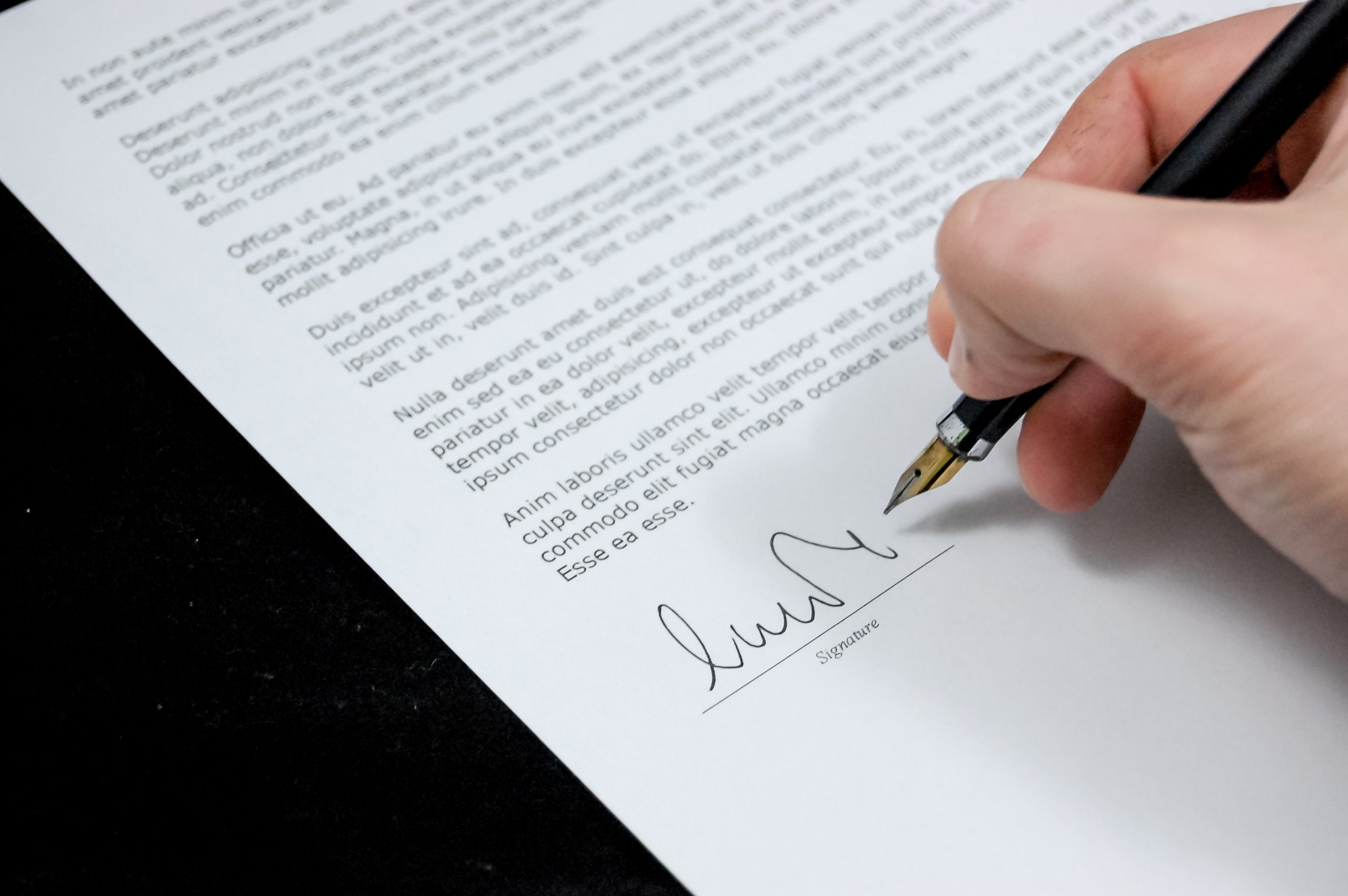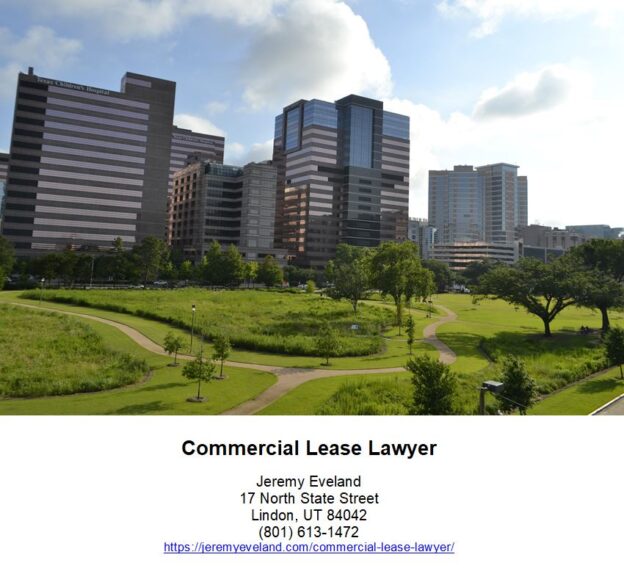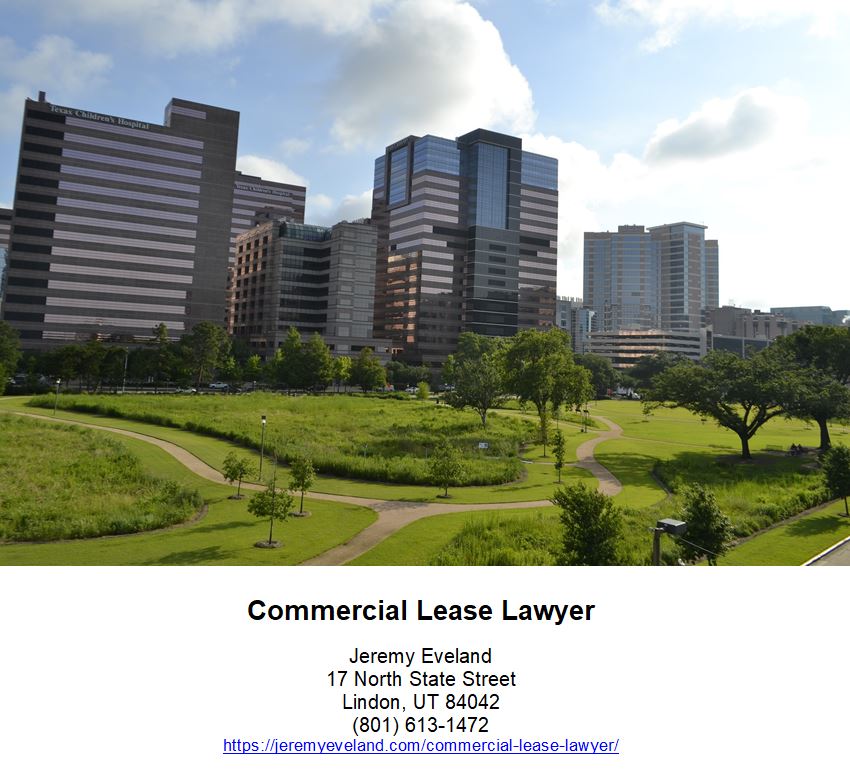Utah commercial lease agreements come with a variety of legal considerations that all parties involved should be aware of. These considerations aim to protect the rights and interests of both landlords and tenants, ensuring a fair and mutually beneficial agreement. From understanding the importance of clear and detailed lease terms to staying informed about landlord-tenant laws and regulations specific to Utah, navigating the complexities of commercial leases can be daunting. Fortunately, with the guidance and expertise of commercial real estate lawyer Jeremy Eveland, you can confidently enter into a commercial lease agreement that safeguards your rights and helps you achieve your business goals. Reach out to schedule a consultation and gain invaluable insights into the key legal considerations for Utah commercial lease agreements.
Overview of Utah Commercial Lease Agreements
Utah Commercial Lease Agreements play a vital role in the success of businesses across the state. Whether you are a landlord or a tenant, understanding the basics of these agreements is crucial in ensuring a smooth and mutually beneficial relationship. In this article, we will explore the key aspects of commercial lease agreements in Utah, the essential provisions that should be included, the importance of compliance with landlord-tenant laws, the process of negotiating and drafting these agreements, common challenges and disputes that may arise, and the significance of reviewing and consulting with an attorney. Additionally, we will discuss special considerations for specific types of commercial lease agreements and the various options available for resolving disputes. By the end of this article, you will have a comprehensive understanding of Utah commercial lease agreements and be well-equipped to navigate the intricacies of these legal documents.
Understanding the Basics of Commercial Lease Agreements
Before delving into the specifics, it is important to grasp the fundamental characteristics that differentiate commercial lease agreements from their residential counterparts. While residential leases primarily deal with living spaces, commercial leases encompass spaces used for business purposes, such as offices, retail stores, industrial facilities, restaurants, and more. This fundamental difference leads to variations in the legal requirements and provisions governing these agreements.
Commercial leases are typically more complex than residential leases due to the unique needs and interests of both landlords and tenants. These agreements often involve long-term commitments, substantial financial investments, and a plethora of legal considerations. As such, it is crucial to approach commercial lease agreements with careful attention to detail and seek legal assistance to ensure the best outcomes for all parties involved.

Key Differences between Residential and Commercial Lease Agreements
While both residential and commercial lease agreements establish a contractual relationship between a landlord and a tenant, they differ significantly in terms of their legal requirements and provisions. One major distinction is the level of negotiation and customization allowed in commercial leases. Unlike residential leases, which are subject to many statutory protections and regulations, commercial leases provide greater freedom for the parties to negotiate terms that suit their specific needs and business objectives.
Commercial lease agreements often involve higher financial stakes and longer lease terms. As a result, they include more extensive provisions addressing issues such as rent adjustments, insurance requirements, maintenance obligations, and more. It is important to seek legal advice to navigate these nuances and ensure a fair and balanced agreement that protects the interests of both parties.
Importance of Seeking Legal Assistance
Considering the intricate nature of commercial lease agreements and the potential consequences of an unfavorable agreement, seeking legal assistance is essential for both landlords and tenants. A skilled attorney experienced in commercial real estate can provide invaluable guidance throughout the entire leasing process. They will possess the knowledge and expertise necessary to draft, review, and negotiate lease terms that align with your best interests.
An attorney can help you understand the legal implications of various provisions and ensure compliance with Utah landlord-tenant laws. They will work diligently to safeguard your rights, protect your investments, and mitigate potential risks. By consulting with an attorney, you can embark on the leasing process with confidence, knowing that your interests are being well-represented.
Essential Provisions in Utah Commercial Lease Agreements
Identification of the Parties Involved
Every commercial lease agreement should clearly identify the landlord and the tenant involved in the lease arrangement. This provision should include the legal names of both parties, along with any relevant business entities or representatives. Accurately identifying the parties ensures clarity and helps avoid potential legal disputes in the future.
Description of the Leased Premises
A detailed and accurate description of the leased premises is crucial to avoid any misunderstandings or disputes down the line. This provision should include the address of the property, along with specific details regarding the boundaries, size, and any additional amenities or features that are part of the leased space.
Lease Term and Renewal Options
The lease term is a critical aspect of any commercial lease agreement. It specifies the duration for which the lease will be in effect, detailing the start and end dates. In addition to the initial lease term, it is common for commercial leases to include renewal options, providing the tenant with the opportunity to extend the lease for a specified period. Clearly defining the lease term and renewal options helps both parties plan for the future and avoid potential conflicts.
Rent and Other Payment Obligations
The provisions related to rent and payment obligations lay out the financial terms of the lease agreement. This includes the amount of rent, the frequency of rent payments, acceptable methods of payment, and any penalties for late payments. Additional payment obligations, such as common area maintenance fees or utilities, should also be addressed in this section. Clearly outlining these obligations ensures transparency and prevents misunderstandings regarding financial responsibilities.
Maintenance and Repair Responsibilities
The responsibilities for maintaining and repairing the leased premises should be clearly outlined in the agreement. This includes specifying who is responsible for routine maintenance, repairs, and general upkeep of the property. It is essential to define the scope of maintenance obligations and clarify the party responsible for the costs associated with repairs and improvements.
Usage and Restrictions on the Premises
Restrictions on the use of the leased premises are often necessary to protect the interests of both parties involved. These restrictions may include limitations on the type of business activities allowed, operating hours, signage, and alterations to the premises. Clearly defining the acceptable uses of the space and any restrictions helps maintain the integrity of the property and ensures it is being utilized in accordance with local laws and regulations.
Insurance Requirements
Insurance provisions in commercial lease agreements specify the types and amounts of insurance coverage required by both the landlord and the tenant. This may include liability insurance, property insurance, and any other types of insurance deemed necessary. Clearly outlining these requirements helps mitigate potential risks, protect against unforeseen events, and allocate financial responsibility in case of damages or accidents.
Assignment and Subleasing Provisions
Commercial lease agreements often include provisions related to the assignment or subleasing of the premises. These provisions outline the conditions under which the tenant can transfer their lease to another party or sublet the space to a third party. Additionally, it may address the consent requirements of the landlord and any restrictions or conditions associated with such transfers.
Default and Remedies
In the unfortunate event of a default by either party, the lease agreement should clearly lay out the consequences and remedial actions available. This section may cover issues such as non-payment of rent, violations of lease provisions, or failure to perform required maintenance. By addressing defaults and remedies upfront, both parties can anticipate the potential consequences and work towards resolving any issues promptly.
Termination and Eviction Procedures
Termination and eviction procedures provide guidance on the process that must be followed in the event of lease termination or eviction. This section specifies the notice requirements, timeframes, and any additional steps that must be taken by either party to terminate the lease. By establishing clear procedures, both landlords and tenants can ensure a smooth transition in the event of lease termination.
As each commercial lease is unique, it is crucial to consult with an attorney to ensure all necessary provisions and clauses are included in your lease agreement. A skilled attorney will make sure the agreement reflects the specific needs and objectives of all parties involved, protecting your interests and minimizing potential disputes.
Compliance with Utah Landlord-Tenant Laws
Understanding Utah Landlord-Tenant Laws
Utah has specific laws and regulations governing the landlord-tenant relationship. It is vital for both landlords and tenants to familiarize themselves with these laws to ensure compliance and protect their rights. Utah’s Residential and Nonresidential Landlord-Tenant Act (Title 57, Chapter 17) outlines the rights, obligations, and responsibilities of both landlords and tenants, and it serves as a valuable resource for all parties involved in commercial leasing.
Lease Provisions in Accordance with Statutory Requirements
As commercial lease agreements in Utah must comply with state law, it is essential to ensure that lease provisions align with the requirements set forth in the Utah Residential and Nonresidential Landlord-Tenant Act. These provisions encompass a wide range of areas, including security deposit regulations, notice requirements for entry and termination, tenant rights and protections, and landlord obligations. By including these statutory provisions in your commercial lease agreement, you can ensure compliance with the law and protect your rights.
Security Deposit Regulations
Utah law requires landlords to handle security deposits in a specific manner. The amount of the security deposit that landlords can collect is limited by law, and there are strict guidelines regarding the return of the deposit at the end of the lease term. Commercial lease agreements should clearly outline the terms and conditions associated with the security deposit to comply with Utah’s regulations and prevent potential disputes.
Notice Requirements for Entry and Termination
Utah law mandates that landlords provide reasonable notice to tenants before entering their leased premises for various reasons, such as inspections or repairs. The required notice period may vary depending on the circumstances, and failure to provide proper notice can lead to legal problems. Similarly, both landlords and tenants have specific notice requirements when it comes to terminating a lease agreement. Complying with these notice requirements is crucial for maintaining a harmonious landlord-tenant relationship and avoiding legal repercussions.
Tenant Rights and Protections
Utah law grants certain rights and protections to tenants in the state. These rights cover various aspects, including the right to a habitable dwelling, protection against retaliatory actions, privacy rights, and the right to be free from discrimination. Commercial lease agreements should incorporate these statutory protections to ensure tenants’ rights are respected and upheld.
Landlord Obligations
Landlords in Utah have specific obligations towards their tenants, as outlined in the Utah Residential and Nonresidential Landlord-Tenant Act. These obligations encompass maintaining the premises in a habitable condition, making necessary repairs, and complying with health and safety standards. Commercial lease agreements should reflect these obligations, ensuring that the landlord assumes appropriate responsibilities and remains in compliance with the law.
By adhering to Utah’s landlord-tenant laws and incorporating the necessary statutory provisions in commercial lease agreements, both parties can establish a fair and legally sound relationship.

Negotiating and Drafting Utah Commercial Lease Agreements
Importance of Careful Negotiation in Commercial Leases
Negotiation is a crucial aspect of the commercial leasing process. It allows both landlords and tenants to articulate their needs, address concerns, and arrive at mutually agreeable terms. Careful negotiation can result in a lease agreement that benefits all parties involved and sets the foundation for a successful commercial relationship.
Negotiation provides an opportunity to customize lease provisions to suit individual needs and preferences. It allows landlords to secure reliable tenants and satisfactory financial arrangements, while tenants can advocate for fair terms and favorable conditions. Engaging in open and transparent negotiations enables both parties to understand each other’s expectations and reach a compromise that meets their respective objectives.
Evaluating and Understanding Lease Clauses
Before finalizing a commercial lease agreement, it is imperative to thoroughly evaluate and understand each lease clause. This involves examining the language, implications, and potential consequences associated with each provision. Lease clauses address a wide range of issues, such as rent adjustment mechanisms, tenant improvement allowances, operating expenses, and dispute resolution methods.
Understanding these clauses ensures that both landlords and tenants are aware of their rights and obligations under the lease agreement. It also helps prevent any misinterpretations or misunderstandings down the line, reducing the likelihood of future disputes.
Protecting the Interests of Landlords and Tenants
Negotiating and drafting a commercial lease agreement is an opportunity for landlords and tenants to protect their respective interests and ensure a fair and equitable arrangement. Landlords should consider factors such as the financial stability of potential tenants, the intended use of the premises, and the potential for property damage. On the other hand, tenants must assess the property’s suitability for their business needs, evaluate the lease terms in relation to their budget, and identify any restrictions or limitations that may hinder their operations.
It is critical for both parties to engage in a thorough analysis of the lease agreement and negotiate terms that provide adequate protection and fulfillment of their objectives. Seeking legal guidance during this process can help identify and address potential pitfalls, minimizing future complications and disputes.
Determining Fair Market Rent
Determining fair market rent is a critical step in the negotiation process. Fair market rent refers to the amount a willing landlord and tenant would agree upon in an arm’s length transaction, considering prevailing market conditions. Various factors influence fair market rent, including location, size, condition of the property, demand, and supply in the market.
Landlords should conduct market research to gauge rental rates for similar properties in the area. This information helps set a realistic rental rate that aligns with market trends and ensures competitiveness. Tenants, on the other hand, should perform their due diligence to determine if the proposed rent is reasonable and fits within their budget.
Use of Attorneys During the Negotiation Process
Given the intricate nature of commercial lease agreements, engaging the services of an experienced attorney can significantly benefit both landlords and tenants in the negotiation process. Attorneys specializing in commercial real estate have the knowledge and expertise to review lease terms, identify potential risks or unfair provisions, and ensure that the agreement protects the client’s interests.
An attorney can offer valuable insights into industry practices, highlight potential legal issues, and negotiate favorable terms on behalf of their client. Their guidance can help strike a fair balance between the interests of the landlord and the tenant, resulting in a mutually beneficial lease agreement.
Common Challenges and Disputes in Utah Commercial Lease Agreements
Commercial lease agreements can give rise to various challenges and disputes that may require legal intervention to resolve. Awareness of these potential issues can help landlords and tenants proactively address them and avoid costly and time-consuming litigation.
Rent and Payment Disputes
Rent and payment disputes are among the most common challenges in commercial lease agreements. Disagreements may arise regarding the payment due dates, late payment penalties, rental rate adjustments, or additional fees such as utilities or parking charges. It is crucial for both landlords and tenants to maintain accurate records of rent payments and promptly address any disagreements that may arise.
Failure to Maintain the Premises
Failure to maintain the premises in accordance with the lease agreement can lead to disputes between landlords and tenants. Disagreements may arise regarding the responsibility for repairs, the scope of maintenance obligations, or the timeliness of necessary repairs. Both parties should carefully review the lease provisions addressing maintenance and repair responsibilities to ensure a clear understanding of their respective obligations.
Breach of Lease Provisions
Breaches of lease provisions can occur when either the landlord or the tenant fails to comply with the terms and conditions outlined in the lease agreement. Breaches can range from minor violations, such as unauthorized alterations, to significant defaults, such as non-payment of rent or illegal activities on the premises. Understanding the consequences of breach of lease provisions and addressing any issues promptly can help mitigate potential disputes.
Disputes over Modifications or Improvements
The desire to modify or improve the leased premises can often lead to disputes between landlords and tenants. These disputes may involve disagreements over the nature and extent of the proposed modifications or the responsibility for the costs involved. Proper communication, collaboration, and a clear understanding of the lease provisions pertaining to modifications and improvements are essential in preventing and resolving such disputes.
Termination and Eviction Issues
Termination of a lease agreement or eviction of a tenant can be a complex and contentious process. Disagreements may arise regarding notice requirements, the validity of termination reasons, or the proper adherence to eviction procedures. In such cases, it is essential to consult with an attorney to ensure compliance with Utah landlord-tenant laws and resolve the issues effectively.
By actively addressing these common challenges and disputes, landlords and tenants can foster a more harmonious relationship and minimize the potential for legal conflicts.

Importance of Reviewing and Consulting an Attorney
Role of an Attorney in Commercial Lease Agreements
To safeguard your interests and navigate the complexities of commercial lease agreements effectively, it is crucial to review and consult with an attorney. An attorney specializing in commercial real estate law can provide the necessary guidance and expertise to ensure that your lease agreement meets your specific needs and protects your legal rights.
Attorneys play a vital role in the negotiation, drafting, and review of commercial lease agreements. They offer invaluable insights into the legal implications of various provisions, identify potential risks or unfair clauses, and negotiate favorable terms on your behalf. Additionally, an attorney can help you understand the legal requirements specific to Utah and ensure compliance with the applicable laws and regulations.
Benefits of Legal Advice and Guidance
Seeking legal advice and guidance throughout the commercial leasing process offers several significant benefits. By enlisting the expertise of an attorney, you gain access to their knowledge and experience in dealing with complex lease agreements. They can help you understand the terms and provisions contained within the agreement, ensuring that you are fully aware of your rights and obligations.
An attorney can assist in identifying potential pitfalls, negotiating favorable lease terms, and minimizing the risk of disputes or litigation down the line. They can also offer valuable insight into prevailing leasing practices, helping you make informed decisions and ensuring the best possible outcome for your business.
Reviewing Lease Terms and Provisions
Reviewing lease terms and provisions is an essential step when entering into a commercial lease agreement. An attorney can conduct a thorough review of the lease, identifying any language that may be unclear, ambiguous, or overly advantageous to the other party. By reviewing the lease agreement with an attorney, you can gain a comprehensive understanding of the legal implications of each provision and ensure that the agreement adequately protects your interests.
Addressing Individual Concerns and Priorities
Every commercial lease agreement is unique, and individual concerns and priorities must be accounted for to ensure a mutually beneficial arrangement. An experienced attorney will take the time to understand your specific goals and tailor the lease agreement accordingly. By addressing your concerns and priorities, an attorney can help negotiate favorable terms and provisions that align with your business objectives.
Ensuring Compliance with All Legal Requirements
Compliance with all legal requirements is of utmost importance when entering into a commercial lease agreement. An attorney can ensure that your lease agreement adheres to the specific laws and regulations governing commercial leasing in Utah. By working closely with an attorney, you can avoid potential legal pitfalls while maximizing your legal protections.
By consulting with an attorney and incorporating their guidance throughout the commercial leasing process, you can minimize risks, provide for contingencies, and pave the way for a successful and harmonious leasing relationship.
Special Considerations for Specific Types of Commercial Lease Agreements
Commercial lease agreements can vary significantly based on the type of business and the specific industry involved. Here are some special considerations for different types of commercial lease agreements commonly encountered in Utah:
Retail Lease Agreements
Retail lease agreements typically involve the leasing of space intended for retail businesses, such as stores or boutiques. These agreements often include provisions regarding hours of operation, signage rights, common area maintenance fees, and exclusivity clauses to protect tenants from competitors. Additionally, retail leases may address issues such as sales-based rent adjustments, tenant improvement allowances, and the tenant’s contribution to marketing or advertising expenses.
Office Lease Agreements
Office lease agreements pertain to the leasing of office space for various professional or administrative purposes. These agreements may address factors such as building hours, access to shared facilities or amenities, parking arrangements, and common area maintenance responsibilities. Additionally, office leases often involve provisions related to build-out allowances, leasehold improvements, and the allocation of utility expenses.
Industrial Lease Agreements
Industrial lease agreements focus on leasing spaces for manufacturing, warehousing, or distribution purposes. These agreements typically address issues such as zoning requirements, permitted uses, storage limitations, loading dock access, and environmental compliance. Industrial leases may also involve provisions related to equipment installation, utility usage, waste disposal, and compliance with industry-specific regulations.
Restaurant Lease Agreements
Restaurant lease agreements are tailored to the unique needs of the food and beverage industry. These agreements often include provisions regarding building permits, health and safety regulations, licenses, and compliance with local health department requirements. Restaurant leases may address issues such as tenant improvements specific to the foodservice industry, shared use of outdoor spaces, trash removal, and any restrictions on noise or odor emissions.
Ground Lease Agreements
Ground lease agreements involve leasing the land itself, rather than the buildings or structures on the property. These agreements typically establish a long-term lease between the landowner and the tenant, with the tenant assuming responsibility for developing and maintaining the property. Ground lease agreements may involve unique considerations such as rent escalations, development rights, and the tenant’s obligations regarding improvements, insurance, and tax payments.
When entering into any of these specialized lease agreements, it is essential to consult with an attorney experienced in the specific industry to ensure that your lease agreement adequately addresses your unique needs and legal requirements.
Litigation and Dispute Resolution Options
Understanding Litigation in Commercial Lease Disputes
Despite best efforts to negotiate and draft comprehensive lease agreements, disputes can still arise between landlords and tenants. In the event that disputes cannot be resolved amicably, litigation may become necessary. Litigation is the process of resolving disputes through the court system, with a judge or jury making a final determination on the matter.
Litigation can be a time-consuming and expensive endeavor, often placing a significant burden on all parties involved. The outcome of litigation is uncertain, and it can strain relationships, diminish resources, and disrupt business operations. As such, exploring alternative dispute resolution methods is often advisable before resorting to litigation.
Alternative Dispute Resolution Methods
Alternative dispute resolution (ADR) methods offer an alternative to traditional litigation, allowing parties to resolve disputes more efficiently and with less expense and disruption. There are two primary ADR methods commonly used in commercial lease disputes:
1. Mediation
Mediation involves the appointment of a neutral third-party mediator who facilitates constructive communication between the parties in dispute. The mediator does not make a final decision but helps the parties explore potential solutions and reach a mutually agreeable resolution. Mediation is a non-adversarial process focused on collaboration and can often preserve relationships and business interests.
2. Arbitration
Arbitration is a more formal ADR method where the parties present their case to an arbitrator or a panel of arbitrators. The arbitrator(s) will then render a decision that is binding on the parties involved. Unlike mediation, arbitration resembles a simplified version of litigation, with rules of evidence and procedure that may be less formal than those in a courtroom. While arbitration offers a more structured process for dispute resolution, it still tends to be faster and more cost-effective than traditional litigation.
Both mediation and arbitration provide a level of privacy and flexibility that is not usually available in open court proceedings. Prior to entering into a commercial lease agreement, parties can include provisions outlining the use of mediation or arbitration as the preferred method for resolving disputes. This offers the opportunity to avoid potential courtroom battles and find more amicable and efficient solutions.
Importance of Legal Representation in Litigation
Should litigation become the only viable option for resolving a commercial lease dispute, it is imperative to seek legal representation. Experienced attorneys familiar with commercial real estate litigation can provide valuable guidance throughout the process and diligently advocate for your rights and interests.
Legal representation carries numerous advantages in litigation. Attorneys possess the knowledge of court procedures, rules of evidence, and legal strategies necessary to build a strong case. They can gather evidence, interview witnesses, and present arguments effectively to support your position. Attorneys are well-versed in negotiation and can explore opportunities for settlement or favorable outcomes before pursuing a trial.
In the realm of commercial leasing, where substantial financial stakes and long-term commitments are involved, legal representation is crucial to navigating the complexities of litigation effectively.
Resources for Utah Commercial Lease Agreements
Online Resources for Commercial Lease Agreements in Utah
Utah offers several online resources for individuals seeking information and templates for commercial lease agreements. The Utah State Courts’ website provides access to various forms, including commercial lease templates, eviction notices, and other pertinent forms. Additionally, the Utah Department of Commerce offers valuable resources and guides for businesses operating in the state, including information on commercial leasing.
Local Organizations Offering Assistance
Various local organizations in Utah provide support and guidance for commercial lease agreements. The Utah Association of Realtors (UAR) offers resources and education for real estate professionals, including commercial leases. The Utah Apartment Association (UAA) provides information and services specifically focused on residential rental properties. These organizations can be valuable sources of information, networking opportunities, and professional development for landlords, tenants, and real estate professionals.
Recommended Legal Services for Commercial Lease Agreements
When it comes to commercial lease agreements, consulting with an attorney specializing in commercial real estate law is highly recommended. A skilled attorney can assist you throughout the entire process, from negotiations and drafting to reviewing and resolving disputes. There are numerous law firms in Utah with attorneys experienced in commercial real estate who can provide the necessary legal services and expertise.
Conclusion
Utah Commercial Lease Agreements encompass a wide range of legal considerations and provisions that are crucial for both landlords and tenants to understand. By grasping the basics of these agreements, seeking legal assistance, and ensuring compliance with landlord-tenant laws, you can safeguard your interests, mitigate risks, and establish a mutually beneficial relationship. From negotiating and drafting the agreement to addressing potential challenges and disputes, a well-crafted commercial lease agreement can lay the foundation for a successful and harmonious leasing experience.
With the myriad of complexities that may arise in commercial leasing, consulting with an experienced attorney is essential. An attorney specializing in commercial real estate law can guide you through the process, protect your interests, and provide invaluable insights and support.
Utah Commercial Lease Agreements are multifaceted legal documents, and attention to detail and legal expertise are critical to achieving your business objectives. By recognizing the importance of professional assistance and dedicating time and resources to understanding the intricacies of commercial leases, you can make educated decisions and protect your rights and investments.


















